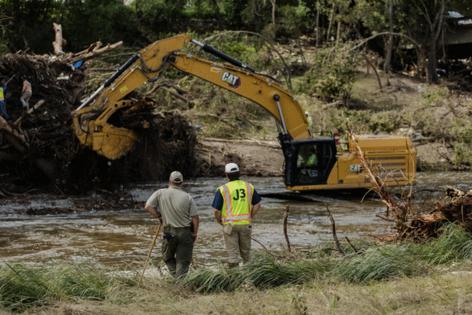At House hearing, scrutiny of FEMA handling of Texas floods
Published in News & Features
House Republicans and Democrats alike Wednesday offered sharp scrutiny of the federal government’s response to a recent Texas flooding disaster that resulted in the deaths of at least 135 people.
The House Transportation and Infrastructure Committee’s Subcommittee on Economic Development, Public Buildings and Emergency Management heard testimony from the top official at FEMA, grilling him on relief efforts in Texas as well as rollbacks within the agency amid President Donald Trump’s stated goal of dismantling the agency.
While Republicans largely sided with Trump’s assertions that the agency is fundamentally ineffective and should be shuttered, Democrats argued the Trump administration largely failed in responding to the Texas flooding.
“Over the years, Congress has passed reform after reform trying to fix FEMA and get federal disaster response to work effectively,” said Republican subcommittee Chair Scott Perry of Pennsylvania. “Quite honestly, little seems to work or have been effective.”
David Richardson, acting director of FEMA, defended the federal government’s response to the Texas disaster as well as the Trump administration’s broader approach to the agency.
“FEMA should never get in the way,” Richardson said. “The original intent of FEMA was to help state, local, tribal and territorial partners build their disaster resilience, response and recovery capabilities and to provide resources when they are overwhelmed by the scope of the disaster.”
The hearing takes place amid work by the Trump administration through the FEMA Review Council headed by Homeland Security Secretary Kristi Noem and Defense Secretary Pete Hegseth to reevaluate FEMA and identify any shortcomings.
Rep. Rick Larsen of Washington, ranking Democrat on the Transportation and Infrastructure Committee, said he’s been working on bipartisan legislation with Transportation and Infrastructure Chairman Sam Graves, R-Mo., that would seek to reform FEMA.
“We’re not waiting for FEMA Review Council,” Larsen said. “We don’t need to wait for a FEMA Review Council. We’ve been reviewing FEMA for a long time, and that’s why the FEMA Act is … getting introduced.”
The legislation, Larsen said, would elevate FEMA to an independent Cabinet-level agency, establish a new public assistance program to give incentives to states to prioritize resilience and rebuilding quickly, create a universal application for federal assistance for disaster survivors, and make it easier for them to access resources for basic needs and housing.
Both parties, however, were united in their scrutiny of the response to the Texas flooding, with a key question from Perry related to the timing of FEMA in responding to the disaster.
When Richardson said federal support came within 24 hours of the state request for federal support on the Monday after the disaster, Perry said the timing was inconsistent with standards to respond to medical evacuation orders within the military and “seems like a long time to wait.”
“When we had a medevac call in Iraq as the commander of the task force, if the aircraft wasn’t airborne within eight minutes of the call, it was a call directly to the Secretary of Defense,” Perry said.
When Perry asked whether FEMA had an established response time to a state request for assistance, Richardson replied they “get there as quickly as possible,” referencing reactions from two teams in neighboring states. Perry pressed for minimum response time, but Richardson said he wasn’t aware of any minimal requirement.
Rep. Greg Stanton of Arizona, top Democrat on the subcommittee, accused Richardson of being “missing in action” for the 48 hours of Texas disaster during the July 4th weekend, pointing he didn’t visit the disaster and made no statement about strategy for more than a week.
“When he appeared finally in Texas on July 12, it felt like a box-checking exercise to quiet his critics,” Stanton said. “He stayed only a few hours. But in his rush, Mr. Richardson failed to check the most important box — human decency.”
Stanton, who peppered Richardson with a series of questions on his initial response to the disaster, took him to task on for a failure to position federal responders in anticipation of the natural disaster. Richardson responded that federal officials were pre-positioned, but that response didn’t allay Stanton during his remarks at the conclusion of the hearing.
“I will strongly disagree that all of the resources were brought to bear that could have been,” Stanton said. “I think it was a choice by FEMA not to fulfill their statutory responsibility to pre-position under the circumstances.”
Democrats also questioned Richardson on a recent article in The New York Times reporting that Noem had a policy requiring all contracts valued at $100,000 to obtain personal approval.
That policy, the Times reported, resulted in discontinuation of the contract of an emergency call center when individuals in Texas were seeking assistance. As a result, FEMA responded to 15.9 percent of calls, not answering thousands of calls from flood survivors. Noem has dismissed the article as “fake news.”
Richardson responded to the article, saying a majority of the callers obtained responses and there was no discontinuation of services.
_____
©2025 CQ-Roll Call, Inc., All Rights Reserved. Visit cqrollcall.com. Distributed by Tribune Content Agency, LLC.







Comments